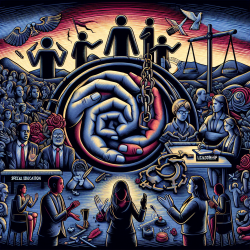Understanding the Complexities of Sexual Violence in Conflict Zones
As a Special Education Director, you may not directly deal with the aftermath of sexual violence, but understanding the dynamics and challenges faced by survivors can enhance your ability to provide comprehensive support to your team and the families you work with. A recent study titled Factors associated with experiencing sexual violence among female gender-based violence survivors in conflict-afflicted eastern Ukraine offers critical insights into the factors influencing sexual violence in conflict settings.
Key Findings from the Research
The study, conducted in conflict-affected eastern Ukraine, highlights several factors associated with sexual violence among women receiving psychosocial services. Notably, younger, single, and internally displaced women were more likely to experience sexual violence. Additionally, the study found significant delays in seeking care among survivors, with many not reporting incidents to authorities.
Implementing Research Outcomes
Practitioners can enhance their skills by integrating these findings into their approach:
- Awareness and Training: Educate your team about the unique vulnerabilities faced by younger, single, and displaced women. Tailor training programs to address these specific needs and improve the identification and support of survivors.
- Encourage Reporting: Develop strategies to create a safe and supportive environment that encourages survivors to report incidents. This may include anonymous reporting options and ensuring confidentiality.
- Timely Access to Services: Implement outreach programs to reduce delays in seeking care. Consider partnerships with local organizations to provide immediate support and resources to survivors.
Encouraging Further Research
The study underscores the need for continued research in conflict settings. Practitioners should advocate for more studies to explore the barriers to reporting and accessing care, as well as effective interventions for preventing sexual violence.
Conclusion
By understanding the complexities of sexual violence in conflict zones, practitioners can better support survivors and contribute to the development of effective prevention and intervention strategies. To read the original research paper, please follow this link: Factors associated with experiencing sexual violence among female gender-based violence survivors in conflict-afflicted eastern Ukraine.










